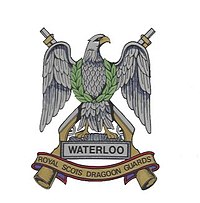Royal Scots Dragoon Guards
| The Royal Scots Dragoon Guards (Carabiniers and Greys) |
|
|---|---|

Cap badge of the Royal Scots Dragoon Guards
|
|
| Active | 2 July 1971 – present |
| Allegiance |
|
| Branch |
|
| Type | Line cavalry |
| Role | Light Cavalry |
| Size | One regiment |
| Part of | Royal Armoured Corps |
| Garrison/HQ | HHQ - Edinburgh Castle Regiment - Leuchars |
| Nickname(s) | Scotland's Cavalry |
| Motto(s) |
Nemo me impune lacessit (No one provokes me with impunity) Ich Dien (I Serve) Second to None |
| March | Quick (band) - The 3DGs; (pipes & drums) - Hielan' Laddie Slow (band) - The Garb of Old Gaul; (pipes & drums) - My Home |
| Mascot(s) | Drum Horse (Talavera) |
| Anniversaries | 13 April (Nunshigum) 18 June (Waterloo) 25 October (Balaklava) |
| Commanders | |
| Colonel-in-Chief | HM The Queen |
| Colonel of the Regiment |
Brigadier S R B Allen |
| Insignia | |
| Tactical Recognition Flash | |
| Arm Badge |
Prince of Wales's feathers from 3rd Dragoon Guards (Prince of Wales's) |
| Tartan | Royal Stewart (Pipers kilts and plaids) |
| Abbreviation | SCOTS DG |
The Royal Scots Dragoon Guards (Carabiniers and Greys) (SCOTS DG) is a cavalry regiment of the British Army, and the senior Scottish regiment. The regiment, through the Royal Scots Greys, is the oldest surviving Cavalry Regiment of the Line in the British Army. The regiment is currently based at Leuchars Station, as part of the Scottish 51st Infantry Brigade.
It was formed on 2 July 1971 at Holyrood, Edinburgh, by the amalgamation of the 3rd Carabiniers (Prince of Wales's Dragoon Guards) (themselves the product of the amalgamation in 1922 of 3rd Dragoon Guards (Prince of Wales's) and 6th Dragoon Guards (Carabiniers)), and The Royal Scots Greys (2nd Dragoons).
The regiment has deployed on four tours of Northern Ireland in 1972, 1974, 1976 and 1980, suffering one fatality in 1972, when Trooper Ian Hunter Caie, was killed by a bomb in a beer barrel that exploded in the path of his Ferret scout car in Moybane, near Crossmaglen County Armagh.
It saw active service during the Gulf War in 1991 deploying 57 Challenger tanks and in Bosnia as part of SFOR in 1996–97.
In 1998, it became the first regiment in the British Army to operate the Challenger 2 main battle tank.
It deployed to Kosovo, as part of KFOR, in 2000.
The regiment deployed to Iraq for Operation Telic, the British element of the 2003 invasion of Iraq. The bulk of the regiment deployed as part of the Scots Dragoon Guards Battle Group with a single squadron (A Squadron) detached to the First Battalion The Black Watch Battle Group. All deployed elements of the regiment took part in the advance on Iraq's second largest city, Basra. Prior to reaching Basra, A Squadron fought in and around Az Zubayr and C Squadron was detached from the SCOTS DG BG to fight with 3 Commando Brigade in actions south of Basra that included Britain's largest tank engagement since the Gulf War, when 14 Challenger 2 tanks engaged and destroyed 14 Iraqi tanks (the so-called '14–0' engagement).
...
Wikipedia
